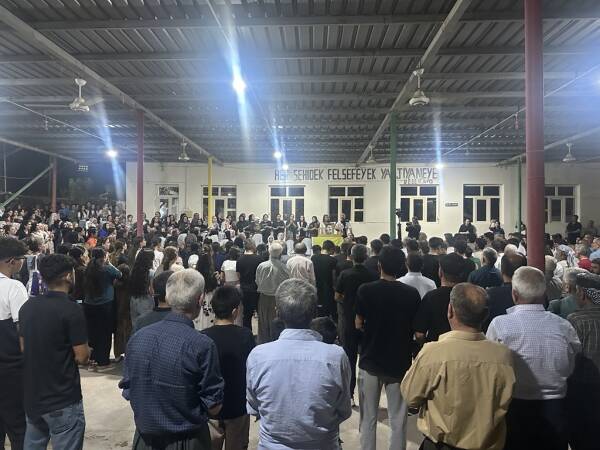A Quarter-Century in Exile: Makhmour Camp Refugees Pin Hopes on Turkey’s Peace Process

Peregraf- Ammar Aziz
A renewed peace process in Turkey is rekindling the dreams of thousands of Kurdish refugees in northern Iraq, who, after more than a quarter of a century in exile, long to return home. For many of them—people with political grievances who are barred from their homeland—the prospect of peace between the Kurdistan Workers’ Party (PKK) and the Turkish state offers a glimmer of hope that their protracted displacement could finally end.
The Makhmour refugee camp, situated in a disputed area between the Iraqi federal government and the Kurdistan Regional Government (KRG), has for 31 years sheltered more than 10,000 Kurdish refugees from Turkey. Many are regarded by Ankara as PKK members or supporters. Life in the camp is marked by hardship, and residents say the ongoing peace talks could open the way for a safe return.
"Everyone wants to return to their homeland," said Mahmoud Ahmed, a long-time resident of Makhmour. "For more than 25 years, we have lived in exile. The announcement of the peace process and the disarmament of PKK guerrillas has brought us closer to going back. It has given us great hope that we will return and be free from camp life," he told Peregraf.
Ahmed, who has been separated from his relatives for decades, stressed that their return depends on the Turkish government fully implementing the peace agreement and guaranteeing they will not face arrest or persecution upon arrival.
Their hopes were further buoyed by a recent message from imprisoned PKK leader Abdullah Öcalan, addressed specifically to the residents of Makhmour. In the statement, published by media close to the PKK on August 8, Öcalan said: "Just as our people of Makhmour were a cornerstone of our struggle in the past, they will have the same important role and mission in this process of building peace and a democratic society. As a dynamic force, taking responsibility and leading is a necessity of their legacy of struggle. With the progress of the process, they too will return to their lands."

Reading Ocalan's message to the Makhmour refugee camp residents, August 8, 2025.
A history of displacement and conflict
The Makhmour camp—officially named the Martyr Rustem Cudi Camp—was established in the 1990s. It is registered with both the Iraqi government and the United Nations.
For years, Turkey has mentioned Makhmour alongside Qandil and Sinjar, areas associated with PKK presence. Ankara has repeatedly threatened and carried out airstrikes on the camp, killing more than 10 people and injuring dozens before the current peace initiative began.
Bwar Amin, the camp’s media officer, said no formal preparations for return have been requested by any authority so far. "Officially, no one has told us to get ready. What is clear is that our return is linked to the peace process. We have only heard that the refugees from the Turkey in Makhmour will eventually go back," he told Peregraf.
The peace process remains in its early stages. On February 27, Öcalan called for PKK fighters to lay down arms and dissolve the organization. The PKK’s congress formally announced its dissolution, and on July 11 a symbolic ceremony saw 30 guerrillas burn their weapons in the Jasana cave in Dukan, Sulaimaniyah.
Turkey’s parliament has formed a commission to oversee the next steps, which include legal reforms, amnesties, and creating conditions for those banned from Turkey to return.
"Before we can go back, several things must happen," Amin added. "Political sentences and imprisonment orders must be annulled. The Turkish constitution must be amended to recognize Kurds as equal to Turks. And our villages, many of which were burned and destroyed, must be rebuilt so people have homes to return to."
The decades-long conflict between Turkey and the PKK has devastated large swathes of northern Kurdistan, displacing entire communities and killing hundreds. Southern Kurdistan (KRG-administered areas) has also suffered from cross-border fighting, with more than 700 civilians killed and many border villages abandoned.
Iraq’s 367-kilometer border with Turkey—over 300 km of which is land—is dominated by rugged mountains where PKK fighters operate. The remote "tri-border" area between Iraq, Iran, and Turkey remains difficult to control, and historically there have been no Iraqi military posts along the frontier.
Daily life in Makhmour is a constant struggle. Ahmed described shortages of food and aid, frequent harassment at checkpoints, and occasional arrests. Iraq sends rations for only 6,000 people—far fewer than the camp’s population—forcing many to work as laborers in other Iraqi cities or within the KRG-controlled areas.
Most refugees from northern Kurdistan who have legal or political cases in Turkey reside in Makhmour, though some are scattered across the Kurdistan Region. Camp residents say conditions have worsened in recent months, with what they describe as a "siege" imposed by Iraqi authorities restricting movement and access to services.
Rizgar Mohammed, mayor of Makhmour, confirmed that no evacuation plans have been communicated. "There is a committee from Baghdad that visits the camp for residents’ issues or requests. Neither the committee nor security forces have mentioned anything about evacuating the camp. If there are official steps, we will take the necessary measures," he told Peregraf.
Despite the uncertainty, the longing to return home remains undimmed.
"The faster the peace process moves forward, and the sooner Mr. Öcalan and his comrades are released, the closer our return will be," said Amin. "After so many years of war and conflict, peace is the only solution."